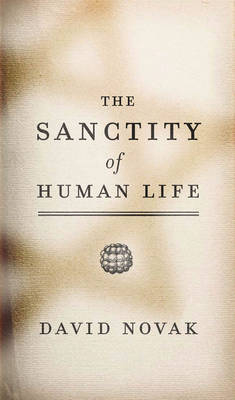
The Sanctity of Human Life
Georgetown University Press (Verlag)
978-1-58901-176-2 (ISBN)
Heated debates are not unusual when confronting tough medical issues where it seems that moral and religious perspectives often erupt in conflict with philosophical or political positions. In The Sanctity of Human Life, Jewish theologian David Novak acknowledges that it is impossible not to take into account the theological view of human life, but the challenge is how to present the religious perspective to nonreligious people. In doing so, he shows that the two positions—the theological and the philosophical—aren't as far apart as they may seem.
Novak digs deep into Jewish scripture and tradition to find guidance for assessing three contemporary controversies in medicine and public policy: the use of embryos to derive stem cells for research, socialized medicine, and physician-assisted suicide. Beginning with thinkers like Plato, Aristotle, Kant, and Nietsche, and drawing on great Jewish figures in history—Maimonides, Rashi, and various commentators on the Torah (written law) and the Mishnah (oral law)—Novak speaks brilliantly to these modern moral dilemmas.
The Sanctity of Human Life weaves a rich and sophisticated tapestry of evidence to conclude that the Jewish understanding of the human being as sacred, as the image of God, is in fact compatible with philosophical claims about the rights of the human person—especially the right to life—and can be made intelligible to secular culture. Thus, according to Novak, the use of stem cells from embryos is morally unacceptable; the sanctity of the human person, and not capitalist or socialist approaches, should drive our understanding of national health care; and physician-assisted suicide violates humankind's fundamental responsibility for caring for one another.
Novak's erudite argument and rigorous scholarship will appeal to all scholars and students engaged in the work of theology and bioethics.
David Novak holds the J. Richard and Dorothy Shiff Chair of Jewish Studies as professor of the study of religion and professor of philosophy at the University of Toronto. In 2006 he was appointed as a member of the Canada Assisted Reproduction Agency.
Preface
1. On the Use of Embryonic Stem CellsNormative Questions and Normative ContextsPhilosophy, Politics, and Theology and Their InterrelationsThe Status of the Embryo in Current Jewish DiscussionNatural Law in JudaismThree Rabbinic Texts Pertaining to AbortionThe Embryo before and after the Fortieth Day of GestationLaw and Scientific EvidenceThe Beginning of Human LifePermission or Obligation?Political RealitiesNotes
2. A Jewish Argument for Socialized MedicineUniversal Health Care: Canada and the United StatesMoral and Theological Problems with the Practice of MedicineMedicine as a Sacred ProfessionMedicine as a CallingNonsectarian MedicineNotes
3. Physician-Assisted SuicideTheology, Philosophy, and PoliticsWho is Guilty in Physician-Assisted Suicide?The Physician Kills the PatientThe Physician Orders the Patient KilledThe Physician Orders the Patient to Commit SuicideThe Physician Prepares the Patient for SuicideSuicide as a Reflexive ActSuicide and Personal ResponsibilityPublic Philosophy in a Secular SocietySuicide: Public and PrivateSociety's Claims on the Individual PersonStruggling against the Politics of DeathNotes
Bibliography
Index
| Erscheint lt. Verlag | 13.9.2007 |
|---|---|
| Co-Autor | David Novak |
| Verlagsort | Washington, DC |
| Sprache | englisch |
| Maße | 140 x 216 mm |
| Gewicht | 431 g |
| Themenwelt | Geisteswissenschaften ► Religion / Theologie |
| Medizin / Pharmazie ► Medizinische Fachgebiete ► Medizinethik | |
| Studium ► Querschnittsbereiche ► Geschichte / Ethik der Medizin | |
| ISBN-10 | 1-58901-176-7 / 1589011767 |
| ISBN-13 | 978-1-58901-176-2 / 9781589011762 |
| Zustand | Neuware |
| Haben Sie eine Frage zum Produkt? |
aus dem Bereich


